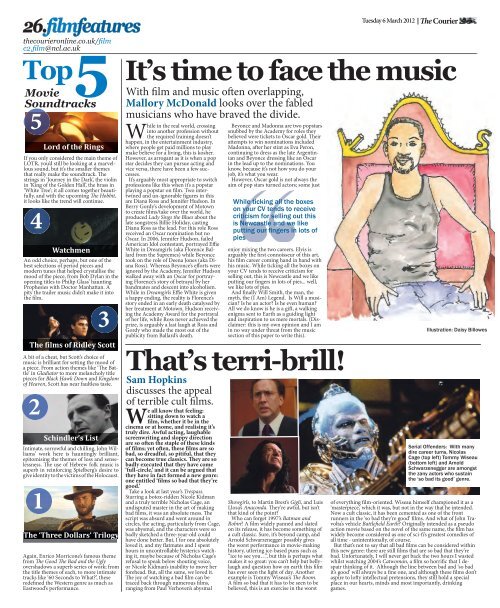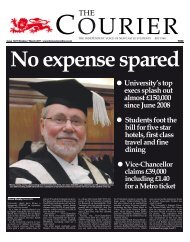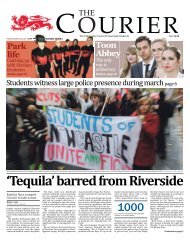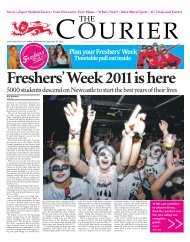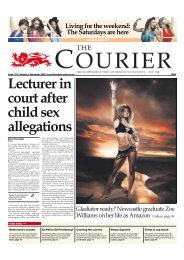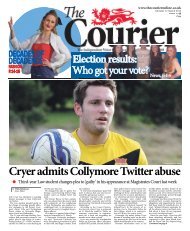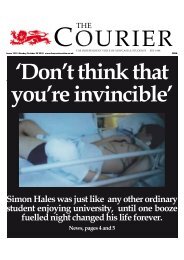Issue 1247 - The Courier
Issue 1247 - The Courier
Issue 1247 - The Courier
You also want an ePaper? Increase the reach of your titles
YUMPU automatically turns print PDFs into web optimized ePapers that Google loves.
26.filmfeatures<br />
thecourieronline.co.uk/fi 5l m<br />
c2.film@ncl.ac.uk<br />
Top<br />
Movie<br />
Soundtracks<br />
5<br />
If you only considered the main theme of<br />
LOTR, you’d still be looking at a marvellous<br />
sound, but it’s the smaller themes<br />
that really make the soundtrack. <strong>The</strong><br />
strings in ‘Journey in the Dark’, the violin<br />
in ‘King of the Golden Hall’, the brass in<br />
‘White Tree’; it all comes together beautifully,<br />
and with the upcoming <strong>The</strong> Hobbit,<br />
it looks like the trend will continue.<br />
4<br />
An odd choice, perhaps, but one of the<br />
best selections of period pieces and<br />
modern tunes that helped crystallise the<br />
mood of the piece, from Bob Dylan in the<br />
opening titles to Philip Glass’ haunting<br />
Prophesies with Doctor Manhattan. A<br />
pity the trailer music didn’t make it into<br />
the film.<br />
2<br />
Lord of the Rings<br />
Watchmen<br />
3<br />
<strong>The</strong> ilms of Ridley Scott<br />
A bit of a cheat, but Scott’s choice of<br />
music is brilliant for setting the mood of<br />
a piece. From action themes like ‘<strong>The</strong> Battle’<br />
in Gladiator to more melancholy title<br />
pieces for Black Hawk Down and Kingdom<br />
of Heaven, Scott has near faultless taste.<br />
Intimate, sorrowful and chilling, John Williams’<br />
work here is hauntingly brilliant,<br />
epitomising the themes of loss and senselessness.<br />
<strong>The</strong> use of Hebrew folk music is<br />
superb in reinforcing Spielberg’s desire to<br />
give identity to the victims of the Holocaust.<br />
1<br />
Schindler’s List<br />
<strong>The</strong> ‘Three Dollars’ Trilogy<br />
Again, Enrico Morricone’s famous theme<br />
from <strong>The</strong> Good <strong>The</strong> Bad and the Ugly<br />
overshadows a superb series of work; from<br />
the title themes of each, to more intimate<br />
tracks like ‘60 Seconds to What?’, these<br />
redefined the Western genre as much as<br />
Eastwood’s performance.<br />
It’s time to face the music<br />
With film and music often overlapping,<br />
Mallory McDonald looks over the fabled<br />
musicians who have braved the divide.<br />
While in the real world, crossing<br />
into another profession without<br />
the required training doesn’t<br />
happen, in the entertainment industry,<br />
where people get paid millions to play<br />
make believe for a living, this is kosher.<br />
However, as arrogant as it is when a pop<br />
star decides they can pursue acting and<br />
vice versa, there have been a few successes.<br />
It’s arguably most appropriate to switch<br />
professions like this when it’s a popstar<br />
playing a popstar on film. Two intertwined<br />
and un-ignorable figures in this<br />
are Diana Ross and Jennifer Hudson. In<br />
Berry Gordy’s development of Motown<br />
to create films/take over the world, he<br />
produced Lady Sings the Blues about the<br />
late songstress Billie Holiday, casting<br />
Diana Ross as the lead. For this role Ross<br />
received an Oscar nomination but no<br />
Oscar. In 2006, Jennifer Hudson, failed<br />
American Idol contestant, portrayed Effie<br />
White in Dreamgirls (aka Florence Ballard<br />
from the Supremes) while Beyonce<br />
took on the role of Deena Jones (aka Diana<br />
Ross). Whereas Beyonce’s efforts were<br />
ignored by the Academy, Jennifer Hudson<br />
walked away with an Oscar for portraying<br />
Florence’s story of betrayal by her<br />
bandmates and descent into alcoholism.<br />
While in Dreamgirls Effie White is given<br />
a happy ending, the reality is Florence’s<br />
story ended in an early death catalysed by<br />
her treatment at Motown. Hudson receiving<br />
the Academy Award for the portrayal<br />
of her life, while Ross never achieved the<br />
prize, is arguably a last laugh at Ross and<br />
Gordy who made the most out of the<br />
publicity from Ballard’s death.<br />
Beyonce and Madonna are two popstars<br />
snubbed by the Academy for roles they<br />
believed were tickets to Oscar gold. <strong>The</strong>ir<br />
attempts to win nominations included<br />
Madonna, after her stint as Eva Peron,<br />
continuing to dress as the late Argentinian<br />
and Beyonce dressing like an Oscar<br />
in the lead up to the nominations. You<br />
know, because it’s not how you do your<br />
job, it’s what you wear.<br />
However, Oscar gold is not always the<br />
aim of pop stars turned actors; some just<br />
While ticking all the boxes<br />
on your CV tends to receive<br />
criticism for selling out this<br />
is Newcastle and we like<br />
putting our fingers in lots of<br />
pies<br />
enjoy mixing the two careers. Elvis is<br />
arguably the first connoisseur of this art,<br />
his film career coming hand in hand with<br />
his music. While ticking all the boxes on<br />
your CV tends to receive criticism for<br />
selling out, this is Newcastle and we like<br />
putting our fingers in lots of pies... well,<br />
we like lots of pies.<br />
And finally Will Smith, the man, the<br />
myth, the (I Am) Legend. Is Will a musician?<br />
Is he an actor? Is he even human?<br />
All we do know is he is a gift, a walking<br />
enigma sent to Earth as a guiding light<br />
and inspiration to us mere mortals. (Disclaimer:<br />
this is my own opinion and I am<br />
in no way under threat from the music<br />
section of this paper to write this).<br />
That’s terri-brill!<br />
Sam Hopkins<br />
discusses the appeal<br />
of terrible cult films.<br />
We all know that feeling:<br />
sitting down to watch a<br />
film, whether it be in the<br />
cinema or at home, and realising it’s<br />
truly dire. Awful acting, laughable<br />
screenwriting and sloppy direction<br />
are so often the staple of these kinds<br />
of films; yet often, these films are so<br />
bad, so dreadful, so pitiful, that they<br />
can become true classics. <strong>The</strong>y are so<br />
badly executed that they have come<br />
‘full-circle,’ and it can be argued that<br />
they have in fact formed a new genre:<br />
one entitled ‘films so bad that they’re<br />
good.’<br />
Take a look at last year’s Trespass.<br />
Starring a botox-ridden Nicole Kidman<br />
and a truly terrible Nicholas Cage, an<br />
undisputed master in the art of making<br />
bad films, it was an absolute mess. <strong>The</strong><br />
script was absurd and went around in<br />
circles, the acting, particularly from Cage,<br />
was abysmal, and the characters were so<br />
badly sketched a three-year-old could<br />
have done better. But, I for one absolutely<br />
loved it, and my flatmates and I spent<br />
hours in uncontrollable hysterics watching<br />
it, maybe because of Nicholas Cage’s<br />
refusal to speak below shouting voice,<br />
or Nicole Kidman’s inability to move her<br />
forehead. But, all the same, we loved it.<br />
<strong>The</strong> joy of watching a bad film can be<br />
traced back through numerous films,<br />
ranging from Paul Verhoven’s abysmal<br />
Showgirls, to Martin Brest’s Gigli, and Luis<br />
Llosa’s Anaconda. <strong>The</strong>y’re awful, but isn’t<br />
that kind of the point?<br />
Who can forget 1997’s Batman and<br />
Robin? A film widely panned and slated<br />
on its release, it has become something of<br />
a cult classic. Sure, it’s beyond camp, and<br />
Arnold Schwarzenegger possibly gives<br />
the worst performance in movie-making<br />
history, uttering ice-based puns such as<br />
“ice to see you…”, but this is perhaps what<br />
makes it so great: you can’t help but bellylaugh<br />
and question how on earth this film<br />
has ever seen the light of day. Another<br />
example is Tommy Wiseau’s Th e R o o m.<br />
A film so bad that it has to be seen to be<br />
believed, this is an exercise in the worst<br />
Tuesday 6 March 2012<br />
Th e<strong>Courier</strong><br />
Illustration: Daisy Billowes<br />
Serial Offenders: With many<br />
dire career turns, Nicolas<br />
Cage (top left) Tommy Wiseau<br />
(bottom left) and Arnold<br />
Schwarzenegger are amongst<br />
the zany actors who sustain<br />
the ‘so bad its good’ genre.<br />
of everything film-oriented. Wiseau himself championed it as a<br />
‘masterpiece,’ which it was, but not in the way that he intended.<br />
Now a cult classic, it has been cemented as one of the front<br />
runners in the ‘so bad they’re good’ films. And what of John Travolta’s<br />
vehicle Battlefield Earth? Originally intended as a pseudo<br />
action movie based on the novel of the same name, the film has<br />
widely become considered as one of sci-fi’s greatest comedies of<br />
all time - unintentionally, of course.<br />
But that’s not to say that all bad films can be considered within<br />
this new genre: there are still films that are so bad that they’re<br />
bad. Unfortunately, I will never get back the two hours I wasted<br />
whilst watching 2004’s Catwoman, a film so horrific that I despair<br />
thinking of it. Although the line between bad and ‘so bad<br />
it’s good’ will always be a fine one, and although these films don’t<br />
aspire to lofty intellectual pretensions, they still hold a special<br />
place in our hearts, minds and most importantly, drinking<br />
games.


